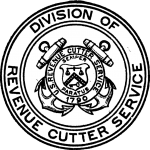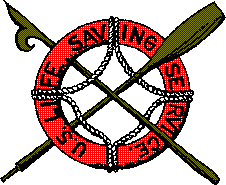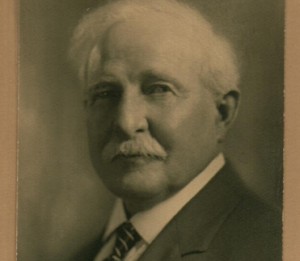One hundred years ago on this day, January 20, 1915, the U.S. House of Representatives, on the recommendation of then President Woodrow Wilson passed the Coast Guard Act of 1915. The bill (S. 2337; a bill “To create the Coast Guard by combining therein the existing Life-Saving Service and Revenue Cutter Service.” ) had been introduced to the U.S. Senate on May 16, 1913 by Senator Charles E. Townsend of Michigan, was referred to committee and ultimately passed by the Senate on March 12, 1914.
The bill, if signed in to law, would form the United States Coast Guard by merging the existing Revenue Cutter Service and the United States Life-Saving Service. More importantly to the “Sky Pilot of the Great Lakes” Rev. William H. Law, it would provide an updated pay structure and provide pensions to the men in their service.

The battle for a law favorable to the welfare the life-savers and their families had been waged by many as early as the late-1800’s. William H. Law, as part of his mission, took it upon himself to inform the public and their representatives in government of this need as early as 1900, after his own life was rescued by men of the USLSS. In his 1902 publication, “Life Savers in the Great Lakes”, W. H. Law includes the following intent:
These pages are written and sent out as an expression of appreciation for the services of the Life Savers in taking the author, his son, and a friend from a stranded yacht, with a hope that the people’s representatives in the United States Congress may be favorably disposed toward a bill pertaining to the Life Savers now in the hands of a committee.
Though these earlier attempts at the passage of a bill to enact a pension for the men in the USLSS had failed, W. H. Law persisted in his efforts to garner support for a pension bill to be enacted. Working with Senator Charles E. Townsend, they would draft a bill that the Senator could bring to the floor and have a chance of being passed.

One of the main sticking points of such a bill was the fact that the USLSS was in essence a civil service and that by granting pensions to the members they would be opening the door for the pensioning of all civil service employees. In order to get around this, the bill would be worded instead as a reorganization plan, combining the USLSS and the Revenue Cutter service into a new organization called the Coast Guard with provisions to place them under the authority of the military, thus removing them from civil service. “If they pensioned the lifesaver they left the field open to the vast array of civil service employees. They [the government] couldn’t do that, so we decided to ask for a reorganization putting the lifesaver on par with the naval reservist and the navy men, where he belonged,” W. H. Law stated to the Detroit Free Press in 1915.
While Senator Townsend was preparing to bring the bill to the floor in 1913, the Sky Pilot of the Great Lakes started a lobbying campaign of his own, sending various letters and stories of the brave men of Life-Saving Service directly to the homes of the very Senators and Congressmen who would have a chance to vote for the passage of this bill.
The letter was well received and many congressmen and senators wrote back assuring they would do everything they could for the passage of the bill. One senator from a landlocked state sent this reply to Rev. Law:
We senators and congressmen from states in the interior have little or no personal knowledge of the Life Savers, and I want to thank you for the information you have given me. I have read with a great deal of interest what you mailed me for it came to my home. Your interesting stories concerning the Life Savers were read by my family and talked over at the dinner table. It was thoughtful of you to send your literature to congressmen and senators while at home, for when in Washington they are very busy. May I trouble you to state, what, in your judgment, would be the best course of procedure to improve Service. From what I have read, I have faith in you and I am sure from your experience in having personally visited all the stations on the Great Lakes, and by keeping in touch with those on the various oceans by mail, you are in a position to give me the material I need in drafting a bill. Rest Assured I will do all I can to improve the condition of these brave but poor paid men.

The Sky Pilot of the Great Lakes, Rev. law (born January 21, 1852) took the passage of the bill in the House of Representatives as an early birthday present. Eight days after the passage of the act by the House, President Wilson signed the act into law thereby creating the United States Coast Guard.
John
His passion for the Great Lakes and its history grew from the stories handed down through both sides of his family about Rev. Law’s travels and relatives lost in the sinking of the S.S. Carl D. Bradley.
He currently resides with his wife, Kimberly, in Brooklyn, MI.
Latest posts by John (see all)
- New Book – Birds and Beacons of Michigan - December 1, 2019
- Three Generations - August 11, 2016
- Rogers City, The Nautical City - July 27, 2016